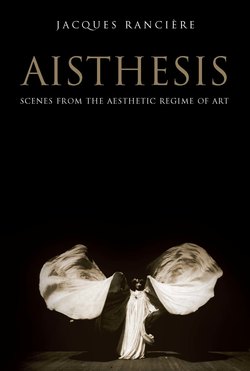Aisthesis

Реклама. ООО «ЛитРес», ИНН: 7719571260.
Оглавление
Jacques Ranciere. Aisthesis
Отрывок из книги
Scenes from the Aesthetic Regime of Art
Jacques Rancière
.....
History is not the dreadful totality to which art was surrendered as a result of its break with classical harmony. It is a two-faced force itself: for it separates as much as it joins together. It is the potential of community that unites the sculptor’s act with the practice of craftsmen, the lives of households, the military service of the hoplites, and the gods of the city. But it is also the power of separation that provides the enjoyment of ancient art – and the enjoyment of art in general – to those who can only contemplate the blocks of stone where the potential of community was saved and lost simultaneously. It is because it is divided itself, because it excludes at the same time as it gathers, that it lends itself to being the place of Art – that is, the place of productions that figure the division between the artist’s concepts and beauty without concept. The mutilated and perfect statue of the inactive hero thus gives way to the complementarity of two figures. The head without will or worry of the Juno Ludovisi emblematizes the existence of art, in the singular, as a specific mode of experience with its own sensible milieu. The Torso’s inexpressive back reveals new potentials of the body for the art of tomorrow: potentials that are freed when expressive codes and the will to express are revoked, when the opposition between an active and a passive body, or between an expressive body and an automaton, are refuted. The future of the Torso is within museums that make art exist as such, including and above all for their detractors; but it is also in the inventions of artists that will now strive to do the equivalent of what can no longer be done, by exploring the differences within bodies themselves and awakening the hidden sensible potential in inexpressivity, indifference, or immobility. The very dreams of a total work of art, of a language of all the senses, a theatre given over to collective mobilization, art forms identical to the new forms of life – all these dreams of ethical fusion following representative distance are possible only on the basis of a more intimate separation. The history of the aesthetic regime of art could be thought similarly to the history of the metamorphoses of this mutilated and perfect statue, perfect because it is mutilated, forced, by its missing head and limbs, to proliferate into a multiplicity of unknown bodies.
1 Johann Joachim Winckelmann, The History of Ancient Art, vol. II, transl. G. Henry Lodge (Boston: James R. Osgood and Company, 1880), pp. 264–5. [Translator’s note: Wherever possible, I quote the published English translations for passages cited from texts in languages other than English. At times, I have silently modified the quotations from these published translations. Otherwise, all translations are my own.]
.....